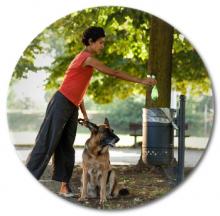Dog and Livestock Care
 When it rains, dog and other animal waste left on lawns, sidewalks and streets can wash into stormdrains and flow untreated directly into our local waterways. The bacteria and risk of disease threatens the health of our community. Follow these easy steps to be a responsible pet owner and help protect your family and environment’s health.
When it rains, dog and other animal waste left on lawns, sidewalks and streets can wash into stormdrains and flow untreated directly into our local waterways. The bacteria and risk of disease threatens the health of our community. Follow these easy steps to be a responsible pet owner and help protect your family and environment’s health.
Pick up after your pet
Often, dog waste gets left on sidewalks and streets. More than just a nuisance, it can spread disease and threaten public health. But preventing this pollution is as easy as 1-2-3:
- Bring a bag
- Clean it up
- Dispose of it properly, in the toilet or trash
Washing pets
If possible, bathe your pets indoors, using less toxic shampoos, or have your pet professionally groomed. Pet shampoos and soaps, even those that are biodegradable, can be toxic to people and marine life.
Flea control
Consider using alternatives such as oral or topical flea control products. If you use flea control products such as shampoos, sprays or collars, make sure to dispose of unused quantities properly.
Horse and livestock activities
When conducting horse and livestock activities such as building a corral, feeding livestock or cleaning and grooming horses, follow these simple tips to prevent discharges from entering storm drains.
Facilities design
- Site barns, corrals and other high-use areas on the portions of the property that drain away from the nearest creek or storm drain.
- Restrict animal access to creeks and streams, preferably by fencing.
- Protect manure storage facilities from rainfall and surface runoff.
- Install gutters that will divert runoff away from livestock areas.
Pasture management
- Confine animals in properly fenced areas, except during exercise and grazing.
- Animal areas should be swept or shoveled at least once a day, and not hosed down to a stream or storm drain.
Grazing management
- During heavy rainfall, consider indoor feeding, a practice which keeps more manure under a roof and away from runoff.
Collection and storage
- Store animal waste in a sturdy, seepage-free unit.
- Line waste pits or trenches with an impermeable layer.
Use and disposal
- Compost soiled bedding and manure.
- Give away composted material to local greenhouses, nurseries and botanical parks.
- Transport manure to topsoil companies or composting centers.
Grooming
- Use less toxic alternatives such as bacterial insecticides, diatomaceous earth insecticidal soaps, boric acid powder, horticultural oils and pyrethin-based insecticides.
- When washing livestock, allow wash water to seep into the ground or conduct in an area that is routed to the sanitary sewer.




